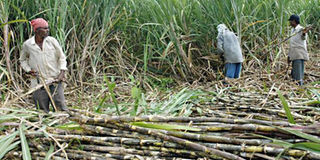Sugarcane growers to start own factory

People cutting sugarcane on a farm. FILE PHOTO
What you need to know:
- Farmers’ belief. Growers think that coming together to produce their own sugar will save them from being paid peanut by the current sugar millers.
- Demand. Ugandan sugar demand is about 350,000 tonnes per year and is currently satisfied by domestic production but, according to the Uganda Sugar Manufacturers Association predictions consumption will double by 2030, a supply deficit is likely to emerge in the coming years and generate opportunities for investment.
Jinja. With sugar prices continuing to drop, farmers in Busoga region are moving to start their own sugar factory to reap from benefits that come with value addition.
The price of sugarcane, the main raw material for sugar, has dropped by Shs25,000 in the last three months at all the sugar factories in Busoga region and the neighbouring districts.
A mini-survey conducted by Daily Monitor discovered that sugarcane prices which stood at Shs175,000 a 50-kilogramme sack at factory gates mid last year, have been gradually reducing to now Shs150, 000.
Farmers had earlier complained that proprietors of millers in Busoga cut down sugarcane prices without consulting them as stakeholders.
Efforts
In a meeting of the sugarcane outgrowers in the region held at Kakira Town Council in Jinja District recently, the farmers unanimously agreed to spear-head a campaign of starting their own sugar factory as a way of adding valve to their produce other than selling raw materials to millers who are currently buying it at a very cheap price.
Mr Ronald Ayagalwa, a sugarcane farmer in Jinja, said farmers put in a lot of money in growing sugarcane including high interest on loans, cost of seedlings, renting land, planting, harvesting and transporting it to the factory.
He said the reduction in prices affects them greatly, adding that setting up their own factory will deter the present investors in the sugar industry from paying farmers peanuts.
He said: “We are over 13,000 farmers in Busoga and we are convinced we can raise Shs1.5b with the help of banks to set up our own factory.”
Mr James Bagoole Mubinge, also a sugarcane grower in the region, said Busoga had already got a solution to poverty through sugarcane growing but these efforts are now being sabotaged by investors who are paying them very little money.
“We have been able to pay school fees for our children through sugarcane growing but now the prices have reduced. If millers have conspired to reduce prices, we are going to invite the President (Yoweri Museveni) to intervene,” Mr Mubinge said, adding: “We have to come together and instead of selling sugarcane as a raw material, let us sell it as valve added by making our own sugar.”
Process started
The chairperson of Busoga Outgrowers Association, Mr Issa Budhugo, said they have kick-started the process of opening up their own sugar factory through establishing a strong co-operative which will give them the bargaining power.
“To industrialise this country, sugarcane farmers must be involved in the production of sugar and if we don’t, then we shall not be competitive and these so-called investors will continue to benefit from our sweat,” Mr Budhugo said.
He added: “We are going to mobilise ourselves and have a mill because these mills are very cheap and the banks are ready to build us a factory.’
Sugar policy
However, under the Sugar Policy which has since been transformed into a Bill pending consideration by Parliament, sugar mills must be located within a minimum radius of 50 kilometres apart.
The sugarcane farmers’ announcement comes at a time when government is in advanced stages of relocating some of the sugar mills in Busoga with incentives of a relocation fee and tax holiday.
Currently, Busoga region has five sugar factories: Kakira Sugar, Mayuge Sugar Factory, Kamuli Sugar Ltd, Kaliro Allied & Sugar Ltd and GM Sugar in Njeru.
It was reported that the State minister for Karamoja Affairs, who is also Bugabula North MP, Mr Moses Kizige, recently said government will relocate GM Sugar (Uganda) Limited and Mayuge Sugar Industries Ltd to other areas in a bid to minimise competition for sugarcane. This, he said, would be done after the passing of the Sugar Bill.
In the new policy, anyone intending to startup a new sugar factory must have their own sugarcane plantation with capacity to generate 75 per cent of the required raw material. And it must be within a distance of 50 kilometres from an existing one.
Manufacturers speak
When contacted, the chairperson of Uganda Sugar Manufacturers Association Mr Jim Kabeho, said the reduction of the sugarcane prices came after the sugar manufacturers decided to reduce on the prices of sugar from Shs4,500 to Shs3, 800 per kilogramme.
“Sugarcane is the main raw material for sugar. If its price goes down, automatically we also have to reduce on the amount of money we buy each tonne of sugarcane,” he said.
To Mr Mayur Madhvani, the Madhvani Group of Companies managing director, sugar factories in Busoga region have increased the demand for sugarcane which has compelled millers to buy immature sugarcanes in order to remain operational.
Demand. Ugandan sugar demand is about 350,000 tonnes per year and is currently satisfied by domestic production but, according to the Uganda Sugar Manufacturers Association predictions consumption will double by 2030, a supply deficit is likely to emerge in the coming years and generate opportunities for investment.
Following a drought that adversely affected the water levels of Lake Victoria, which ended around 2011 or 2012, two misconceptions arose: Uganda was incapable of growing enough raw cane for domestic consumption; and any claim by Uganda that it had a sugar surplus was based on the fact that Brazilian sugar barons were dumping sugar on the Ugandan (and Kenyan) markets.
Both governments allowed the development of a verifiable, inter-government, database showing production, consumption and export data for Uganda since 2013.




